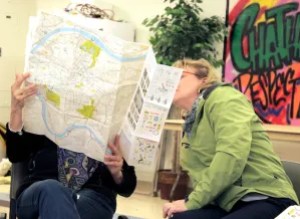Even with our hills, rain and snow, Pittsburgh has more women riders than the national average—and BikePgh is doing its part to keep them all connected. On March 28, BikePgh—along with partner Carnegie Mellon University—will cohost the 2nd annual Pittsburgh Women & Biking Forum.
“It’s a space for women of all ages and backgrounds to come together —it doesn’t matter if you are a trail rider, a rider with family, or a commuter—there’s something for everyone,” says Rebecca Susman, membership and outreach manager for BikePgh and the founder of its Women & Biking program.
According to the League of American Bicyclists, “women accounted for just 24 percent of bicycle trips in the U.S.” BikePgh numbers skew higher: 37 percent of its members are women.
And that 37 percent gave their input: “Women wanted a space where they felt comfortable sharing their stories—and that’s the impetus for this forum,” says Susman. “They had skills and knowledge to share—and they wanted to learn together.”
Last year’s event drew 100 women riders “from college age to grandmothers,” says Susman. “Biking is a great equalizer. When you ride and have that in common, you have similar experiences and find yourself laughing at the same things.”
The event will have two keynote speakers, six sessions and a catered lunch. At the day’s end, Pittsburgh Babes on Bikes will lead interested women on a casual “talking” ride that starts on the CMU campus.
The summit runs from 9:30 a.m. to 3 p.m. at CMU Porter Hall, Frew Street. Tickets cost $20 for non-members and $15 for members. For more information or to register for the forum, check here.
The lineup of workshops and speakers includes:
Getting to know your bike: Basics of bike maintenance.
Traversing the trails: Learn favorite routes for fun or commuting, how to navigate the conditions and get tips on trail etiquette for “not being a jag.”
The power of women: Stories as a tool for change.
Getting around on your bike: How to “carry stuff and arrive comfortably.”
Responding to bikelash: Learn the language to talk with people about the myths and misconceptions around biking—and the new bike lanes.
There are two keynote speakers:
Monica Garrison of BlackGirlsDoBike.com (BGDB). She founded this group two summers ago after she began riding more frequently and thought, “There should be more women of color on bikes.” She started a Facebook group to create a space where “women could collectively talk about our experiences.”
Within two years, she gathered 4,000 followers—and created a community. BGDB is now a national organization with chapters in 35 cities such as Austin, Madison, Sacramento, Chicago, Los Angeles, Baltimore—and as of this month, Pittsburgh.
Although Garrison is from Pittsburgh, she’s been so busy helping other cities launch their own groups, she’s just recently had enough breathing space to create a local chapter.
“We are growing a community that gets women on bikes,” says Garrison.
Ren Barger is the founder and CEO of Tulsa Hub in Tulsa, OK. After a near-death experience on her bike, and a three-week recovery at a hospital in an impoverished, immigrant community, she found a mission to “change lives through cycling.”
Tulsa is a sprawling city with not-world-class public transit.” People get stuck,” she says. “The bike is the solution to shrink the scale and improve their lives.”
Through her Earn-a-Bike program, she aims to get bikes in the hands of “people in poverty, people with physical and mental disabilities, and people who are otherwise disenfranchised.” Since 2009, Tulsa Hub has helped “370 adults earn reliable transportation” and given more than 1,000 bikes to elementary school children.
“Cycling and social justice are my passions,” says Barger. And in Tulsa Hub, she found the platform to advocate for both. “Transportation access is a civil rights issue—and a human rights issue.”
History agrees with Barger.
In 1896 Susan B. Anthony said that bicycling had “done more to emancipate women than anything else in the world,” according to the article Women on Wheels: The Bicycle and the Women’s Movement in the 1890s written by Peter Zheutlin.
He writes that the women’s movement of the 1890s and the cycling craze were “inextricably intertwined” because mastery of the bicycle became “a metaphor for women’s mastery over their own lives.”
Women saw the cycle as “a freedom machine.”
As XXers learned to ride, they gained physical mobility that broadened their horizons beyond their own neighborhoods, and they no longer needed to depend on men for transportation. Also, they discovered a new-found sense of freedom of movement, “a freedom previously circumscribed by the cumbersome fashions of the Victorian era,” writes Zheutlin. This need for increased mobility led to bloomers—and eventually, one century later—to spandex.
Susman is correct: biking is a great equalizer. Plus, it’s just plain fun.
The Pittsburgh Women & Biking Forum is the only summit for women’s biking in the city, so it’s a “unique experience to talk with other women about riding.”






